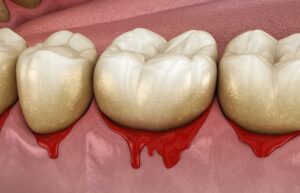Flossing is a major component of a good oral hygiene routine. You use this waxed string to scrub away plaque build-up between your teeth. But you might notice that this cleaning regimen irritates your gums and makes them bleed.
While some bleeding is normal if you are just beginning to introduce flossing to your routine, chronic irritation of the gums from flossing is a serious problem. You should not ignore this symptom if it continues each time you floss.

What Causes Bleeding in the Gums While Flossing?
Understanding the potential causes of this symptom can encourage you to talk to your dentist to address the problem. Read on to learn three of the primary reasons why you might see bleeding from your gums as you floss.
Improper Flossing Technique
Persistent bleeding in the gums can occur when flossing if you use an improper technique during this step of your oral hygiene routine. Harsh movements as you clean between the teeth can hurt your gums, making them bleed and feel sore. You should not use such severe tactics while flossing, as hurting your gums this way leaves them more vulnerable to infection.
Use gentle movements as you navigate the floss between your teeth. Rub against the sides of each tooth with purpose. This ensures your teeth get properly cleaned without harming your gums in the process.
Bleeding can happen in the gum tissue if you have a great deal of plaque or tartar build-up too. This is why people tend to see bleeding when they first start flossing. To avoid this problem, practice consistent oral hygiene when it comes to flossing and brushing your teeth. Make sure you attend regular teeth cleanings with your dentist to maximize oral hygiene too.
Gum Disease
Bleeding in the gums is a common symptom of an infection in the gum tissue known as gum disease. This occurs when natural oral bacteria reach the gums and infect the area. You can also notice soreness, swelling, and redness if you have this disease, which is known as gingivitis in its early stages.
Gum disease will require periodontal therapy from your dentist to treat. Otherwise, the infection will spread to deteriorate your teeth and jaw, which can result in irreversible damage like tooth loss. Visit your dentist for routine oral exams, including periodontal disease screenings, to eradicate gum disease promptly.
Factors Outside Oral Health
Sometimes, bleeding gums can occur due to factors outside of your smile. But you should still tell your dentist about this chronic symptom. Certain medications may make your gums bleed as a side effect.
Underlying health conditions might put you at risk of gum disease. Pregnancy will lead to hormone changes that could increase this danger to the gums. Your diet may also influence your gum health. And if you smoke, you could see damage to your gums, including bleeding, as a result. Learn more by speaking with your dentist about your gum health.
